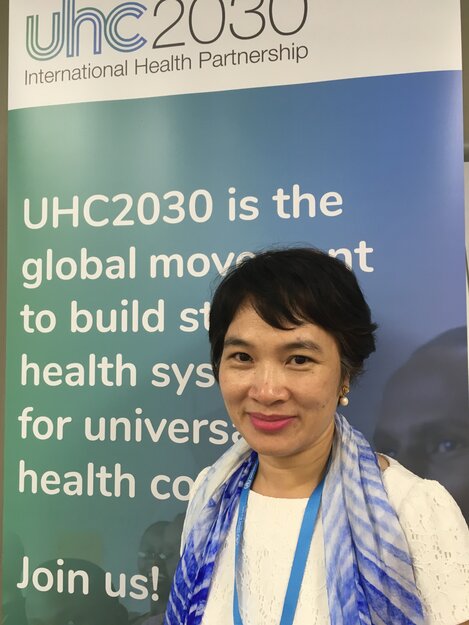New analysis for country teams: Perspectives of 52...
11 July 2017
‘Partner Insight’ by Khuat Thi Hai OANH

Khuat Thi Hai OANH
Executive Director of the Centre for Supporting Community Development Initiatives (SCDI) in Vietnam
SCDI works with vulnerable and marginalized populations focusing on their lives, including increasing social inclusion and reducing marginalization. I’m a medical doctor and enabling people to access healthcare is also a priority for us.
We have been working on the issue of universal health coverage (UHC) with these populations for a long time and we were very happy that universal health coverage finally got into the Sustainable Development Goals and that we have a concrete target for it.
Now I have the opportunity to participate in the UHC2030 Steering Committee as an alternate to the Southern CSO representative and it is really good to experience the way that UHC2030 is organized. UHC2030 is a great opportunity for the world to realize the UHC agenda because UHC2030 brings different partners together.
I participate from the perspective of people working at country level, so I see the value that UHC2030 can bring to countries. Usually, health falls under the responsibility of the ministry of health; within the government the ministry of health is not always the most powerful ministry. So they need a lot of support, not only from within the country but also from outside the country.
UHC2030 actually brings together different partners and stakeholders from the global level and provides support to the ministry of health and to the bilateral and multilateral partners that are trying to promote UHC in the country. Partners such as the World Bank, WHO, EU and Germany have a significant influence at country level. So this means that the ministry of health and the CSOs like us are not alone in promoting UHC in our country. That is one of the values of the UHC2030 platform.
On the other hand the platform is also an opportunity for the partners to learn from each other and find inspiration. Partners can get inspired by other partners, countries can get inspired by other countries. We can all know who is doing what so not only do we learn from each other but we can also create synergies. It is an opportunity for civil society, governments and different partners to interact and work with each other. It is not about civil society shouting and blaming or pointing fingers but we can be constructive partners to work together for mutual and common goals.
The biggest challenge that UHC2030 faces is to arrive at concrete action to avoid being another ‘talk shop’. So it is really important that the partners are accountable for what they have committed to. UHC2030 can then be like a springboard to encourage partners to move forward. We can do this by having very clear and practical accountability indicators, concrete technical assistance, knowledge sharing, and real commitment. I think these kinds of things are very important to avoid lip service.
There are a lot of challenges but this is a new beginning. We have less than 5000 days to go until 2030 but it is a start and everybody has to start from somewhere.
